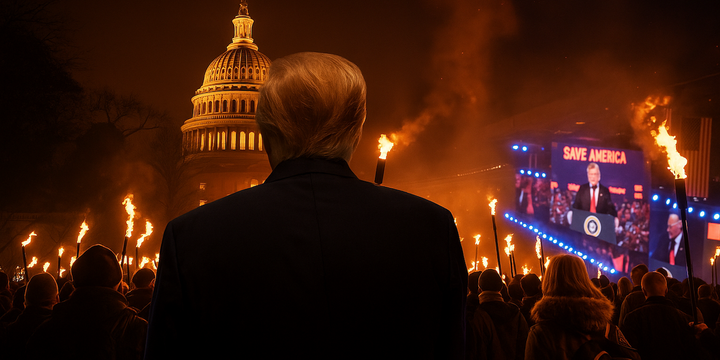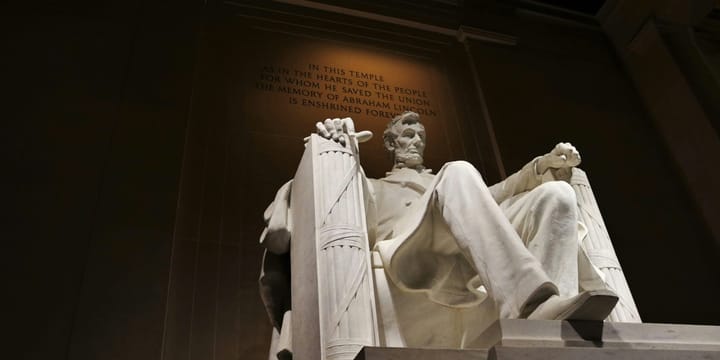Trump's dangerous plan to illegally deploy Texas troops in Illinois
Trump’s plan could tear apart the Union if it goes forward. Either way, it will plunge the country into an unprecedented constitutional crisis. Special off-cycle edition.

The United States stands at a constitutional crossroads. What began as rhetoric about federal law enforcement has escalated into something far more dangerous—the potential deployment of one state's military forces against another state's citizens.
According to Illinois Governor J.B. Pritzker, leaked plans reveal that President Trump intends to use Texas National Guard troops to conduct operations in Chicago.
Such a move that would represent an unprecedented assault on American federalism and the constitutional order itself.
Imaginary dateline: 0800, 16 September 2025
Mexican Independence Day. 300 troops from the Texas National Guard exit the Great Lakes Naval Station heading to Little Village on Chicago's West Side. They are with a large number of I.C.E. Agents. The Guardsmen don't wear mask though. The Texas Guard is there at the request of President Trump, although they have not been explicitly federalized. They remain under Texas Governor Abbott's nominal charge.
In the preceding days, tensions have been running high. Governor Pritzker of Illinois had also mobilized the Illinois National Guard, as is his right, to try to keep the worst from happening. Texas troops opening fire on civilians, even by accident or terrorizing a Chicago neighborhood.
The war of words has also been hot with Governer Pritzker trading barbs with Trump, VP Vance, sand Abbott. And vice versa.
It promises to be a long day.
An extraordinary warning
On Tuesday, Governor Pritzker held what can only be described as an extraordinary press conference. Flanked by Chicago's mayor and the Cook County board president, Pritzker announced that Trump was planning what amounts to an invasion of Illinois—not by federal troops, but by units of the Texas National Guard.
This revelation came after Trump's ominous declaration that he plans to "go into Chicago," adding cryptically, "I'm not saying when, but we're going in."
As Andy Craig reports in The UnPopulist, the governor's warning was triggered by intelligence from what he described as "patriotic Americans within the administration and the military. This astonishing detail would itself represent a breakdown of all civil-military norms. When service members feel compelled to leak classified deployment plans to state governors, it signals a profound crisis in the chain of command and constitutional governance.
While Texas Governor Greg Abbott has issued denials, at least one aspect of Pritzker's allegations has been independently confirmed. The Washington Post verified that the Pentagon has authorized the use of Great Lakes Naval Station as a staging area. Given the gravity of such an accusation, it's difficult to believe Pritzker would sound this alarm without solid intelligence.
The legal tangle
To understand why this represents such a dangerous escalation, we must examine the legal framework governing military deployment within the United States. The Posse Comitatus Act, enacted in 1878, generally prohibits using the military for civilian law enforcement—arresting people, controlling streets, conducting raids.
This principle reflects a fundamental American value: our soldiers are not our police. Slate has good summarization of the legal aspects in a conversation between Dahlia Latwick and Elizabeth “Liza” Goitein (summarized along with Craig throughout).
Trump's previous deployments of Marines and federalized California National Guard in Los Angeles were ruled illegal by a federal judge, precisely because they violated Posse Comitatus. The administration likely understands that repeating this approach in Illinois could face similar judicial rejection.
Enter the legal loophole that makes the Illinois plan so insidious. Rather than federalizing troops, Trump appears poised to invoke 32 U.S.C. § 502(f)(2), a 2006 statute that allows National Guard units to remain under state control while acting "at the request of the President or Secretary of Defense." This provision provides for training exercises on federal bases. it does not allow active deployments in other states.
As constitutional scholar Steve Vladeck explains in Craig's analysis, this creates a dangerous workaround. By keeping Texas troops under Texas command while acting at federal "request," Trump believes he can evade Posse Comitatus restrictions. However, this interpretation stretches the law beyond recognition and creates an even more serious constitutional crisis.
Imaginary dateline: 0920, 16 September 2025
Moving closer to their target, the Texas Guard and I.C.E. agents begin to see Mexican decorations along the street. But as they turn onto the street to take them to the heart of the neighborhood, they see something they were not expecting.

The street already has Guardsmen in place. From the Illinois National Guard.
Everyone stops. The two sets of troops eye one another warily. he quiet is like you hear in the old westerns.
Invasion by another name
The use of Texas National Guard troops in Illinois, while remaining under Texas command, would represent something unprecedented in American history—the literal invasion of one state by another's military forces. Unlike federal troops, which at least operate under federal authority, state troops have no legal jurisdiction whatsoever in other states without explicit consent.
This isn't merely a technical legal violation—it strikes at the heart of American federalism. In our constitutional system, states are sovereign entities, limited by the Constitution but nevertheless possessing their own territorial integrity and governmental authority. The Illinois state flag bears the phrase "State Sovereignty" for good reason: it reflects a fundamental principle of our federal system.
Governor Pritzker, as Illinois's chief executive, has both the power and constitutional duty to defend his state's sovereignty against such an invasion. This scenario would pit state against state in a way not seen since the Civil War, transforming the National Guard from a force for emergency response into an instrument of partisan political warfare.
This is not the fig-leaf state's rights used to justify secession. It's baked into our governmental system and has been since even before the constitution.
The pretense of crime fighting
The administration's justification—fighting crime in Chicago—crumbles under scrutiny. Crime in Chicago has actually been plummeting, currently at its lowest point in decades. The city is statistically safer than many in red states. Any appeal to Labor Day weekend incidents is mere pretext for a predetermined political operation.
This exposes the true nature of Trump's plan. He wants to use military force not for genuine public safety, but as political theater. We wants to demonstrate his authoritarian regime over Democratic-controlled jurisdictions. According to Craig's reporting, the targeting of Hispanic communities, particularly around Mexican Independence Day celebrations on September 16, reveals the ethnic and political motivations underlying these operations.
Consider the parallel Pritzker drew; imagine using armed troops to terrorize Irish Americans on St. Patrick's Day. The absurdity and offensiveness of such an action highlights exactly what Trump is proposing for Latino communities in Chicago.
Constitutional principles under assault
The legal experts are clear about the constraints on presidential power in this area. In Dahlia Lithwick's analysis for Slate, Elizabeth "Liza" Goitein of the Brennan Center explains that the Framers' concerns about military domestic policing as anathema to the fundamental principles of democracy and individual freedom. When soldiers patrol civilian streets, it creates a chilling effect on free expression and dissent—exactly the kind of oppression the Constitution was designed to prevent.
The Posse Comitatus Act exists precisely to prevent this scenario. As Goitein notes in her interview with Lithwick, when military personnel exercise compulsory power over civilians—detaining them, questioning them, compelling their compliance—it triggers all the constitutional concerns about military tyranny that motivated the Founders.
Trump cannot simply federalize the Illinois National Guard for local crime control because no federal law authorizes such action. The Insurrection Act, the broadest domestic military authority available to presidents, only applies to enforcing federal law or protecting constitutional civil rights—not local crime fighting.
As Goitein explains to Lithwick, the administration might attempt to reframe the operation as immigration enforcement, as it did in Los Angeles. However, this faces significant obstacles. Unlike California, there are no mass protests against ICE raids in Chicago to serve as pretext. Sanctuary city policies, while frustrating to the administration, are constitutionally protected under the Tenth Amendment and do not constitute the kind of obstruction that would justify military intervention.
Historical echoes
The parallels to historical tyranny are not lost on those paying attention. The charges against King George III in the Declaration of Independence included:
- "He has kept among us, in times of peace, Standing Armies without the Consent of our legislatures."
- "He has affected to render the Military independent of and superior to the Civil power."
- "For Quartering large bodies of armed troops among us."
These weren't abstract grievances. They were specific objections to the use of military force against civilian populations for political purposes. The American Revolution was fought, in part, to establish the principle that military and civilian authority must remain separate, and that soldiers cannot be used as instruments of political oppression.
The broader implications
What makes this crisis even more alarming is its partisan dimension. Rather than using Illinois's own National Guard for any genuine emergency (as would be normal), the specific choice of Texas forces reveals the administration's intent to weaponize federalism itself. This isn't law enforcement—it's red states versus blue states, Republican governors enabling federal overreach against Democratic jurisdictions.
The precedent this would set is staggering. If a president can "request" friendly governors to send their troops into hostile states, the entire concept of state sovereignty collapses. What prevents future presidents from using this mechanism to effectively occupy political opposition strongholds? What stops the complete militarization of domestic political disputes?
As Craig reports, Pritzker warned, channeling the gravity of wartime communications, these operations would likely involve "masked agents hauling away parents, traumatizing children, disappearing people off the streets." The images from such raids would fundamentally alter the character of American governance, normalizing military occupation of civilian spaces in ways that would have been unthinkable just years ago.
Imaginary dateline: 1000, 16 September 2025
Moving at once without any visible prompt, the Texas troops quickly take position and take an aggressive stance. The I.C.E. Agents, masks rife with sweat even though it's only in the 70s cower behind the National Guard vehicles.
The Illinois Guardsmen also rapidly take defensive positions. All guns are drawn.
And then... is it a tidy withdrawal or is it Fort Sumter again?
We can only hope it doesn't come to this.
The choice we face
The question Pritzker posed cuts to the heart of the matter: "Once they get the citizens of this nation comfortable with the current atrocities committed under color of law, what comes next?" History provides sobering answers to that question.
The United States faces a test of its constitutional foundations. Will the courts act swiftly to prevent this unprecedented assault on federalism? Will Congress assert its constitutional role in governing military deployments? Will the American people recognize the danger of allowing one state's troops to occupy another state's territory for partisan political purposes?
The principle at stake transcends party politics. It touches the very essence of what makes America a nation of laws rather than men, a federal republic rather than a centralized autocracy. The response to Trump's Illinois plan will determine whether the constitutional constraints on executive power remain meaningful or become mere parchment barriers to unlimited presidential authority.
In the words of the Declaration of Independence, we are a nation founded on the principle that governments derive "their just powers from the consent of the governed."
The deployment of Texas troops in Illinois would represent the opposite. It would represent an exercise of military power without consent, in defiance of sovereignty, and in violation of the constitutional order that has preserved American liberty for nearly two and a half centuries.
These are dangerous times, and he stakes could not be higher.
Non in cautus futuri.



